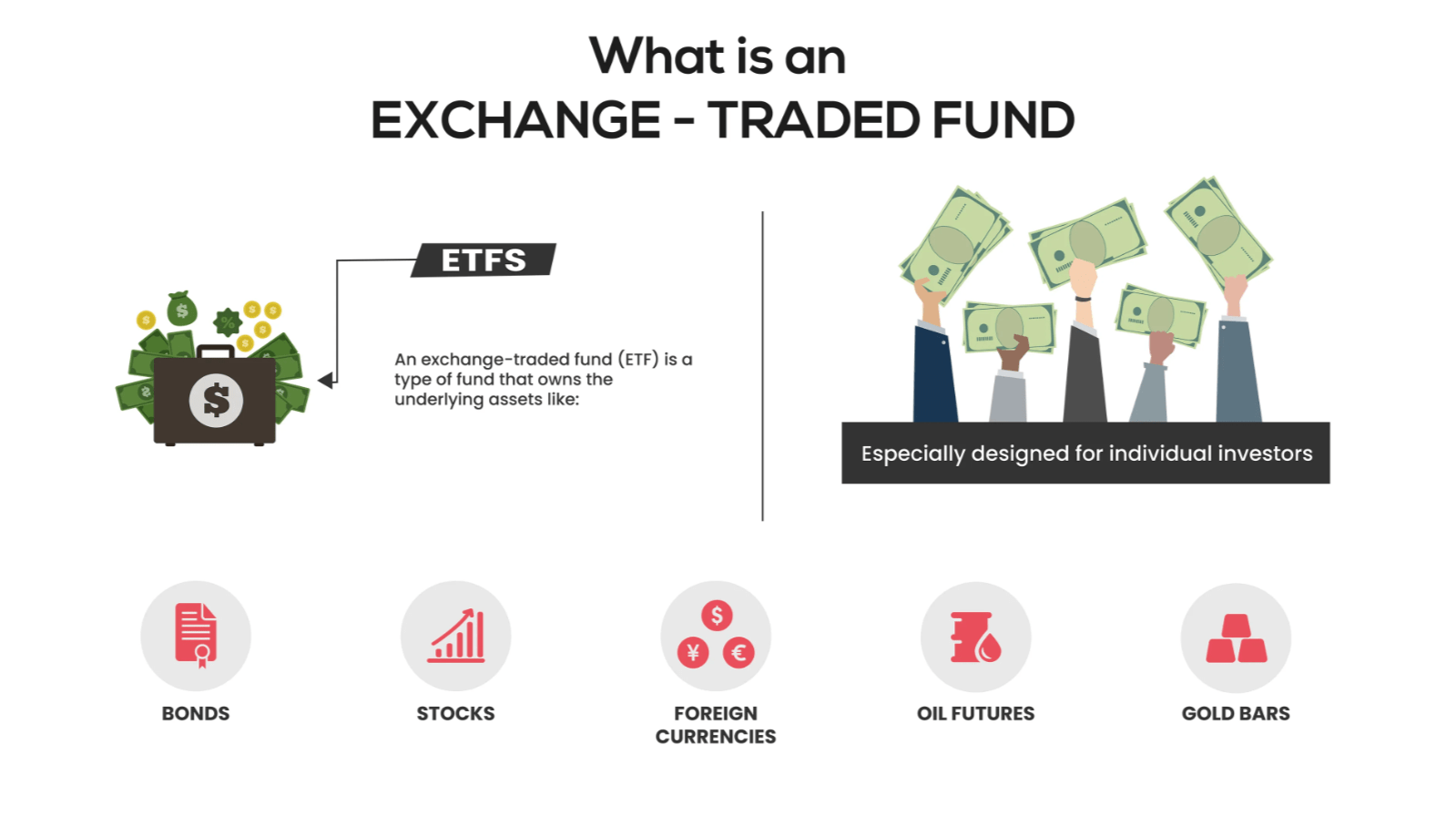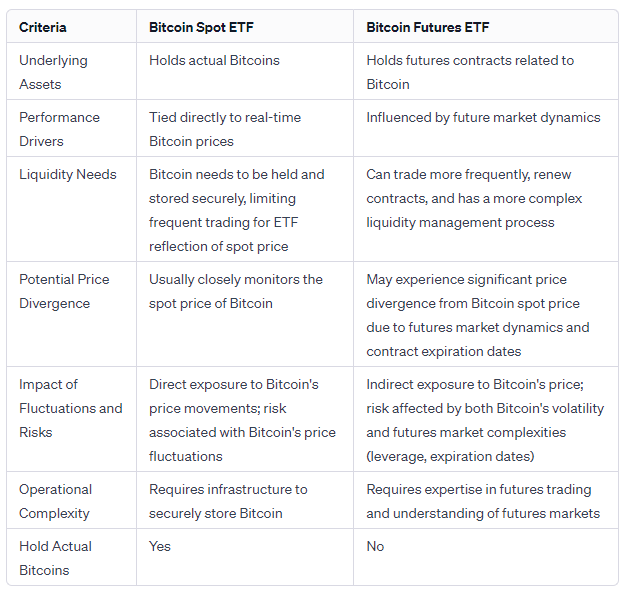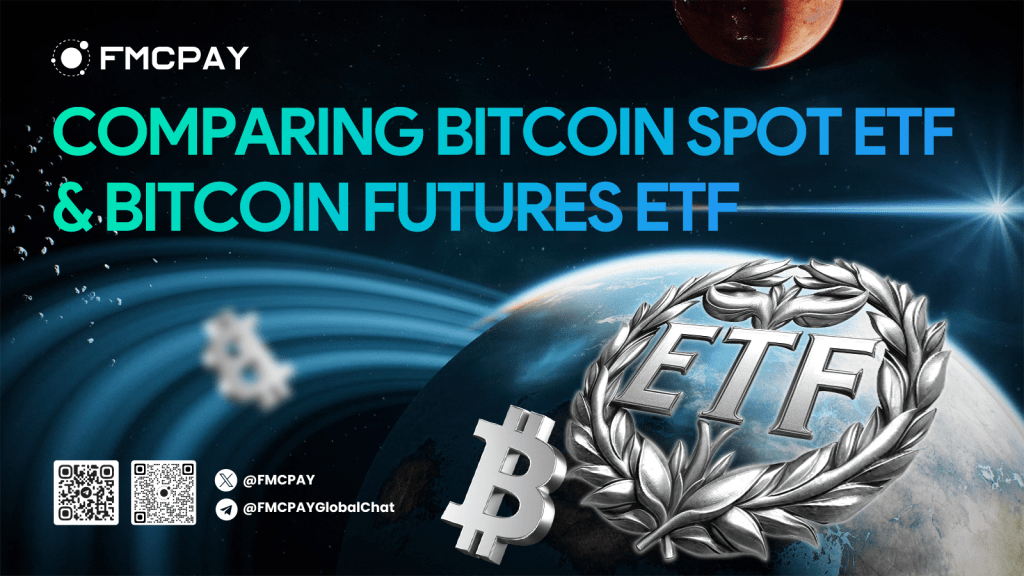The main differences between Bitcoin Spot ETF (Exchange-Traded Funds) and Bitcoin Futures ETF include fundamental assets, performance drivers, liquidity demand, potential price divergence, and risk levels.
In this article, let’s explore the significance and distinctions between these two types of Bitcoin ETFs with FMCPAY.
What is an ETF?
Exchange-Traded Funds (ETFs) represent a category of investment funds actively traded on stock exchanges, akin to individual stocks. These funds typically encompass diverse assets, including stocks, commodities, or cryptocurrencies, to mirror the performance of a specific index or asset.
Example: Consider an S&P 500 ETF, which holds stocks from companies listed in the S&P 500 index. If the index changes its components, the ETF manager adjusts the fund’s holdings to accurately mirror these changes and maintain alignment with the index’s performance.
In contrast to mutual funds, which compute Net Asset Values (NAVs) once at the close of each trading day, ETFs are actively traded on stock exchanges and can be bought and sold throughout the trading day at prevailing market prices determined by supply and demand dynamics.
While an ETF’s NAV is computed multiple times during the trading day, it is the market price that investors utilize for trading purposes. This feature affords investors increased liquidity and flexibility compared to mutual funds. Moreover, investors can employ a range of trading strategies, such as short selling or buying on margin, which are often unavailable with mutual funds.

What is a Bitcoin ETF?
Bitcoin Exchange-Traded Funds (ETFs) have become a significant financial instrument in the evolving landscape of cryptocurrency investments. These ETFs provide investors with a way to engage with Bitcoin price movements without the necessity of directly owning or managing Bitcoin. This indirect exposure is preferred by certain investors.
Bitcoin ETFs encompass a set of assets linked to Bitcoin or its price, traded on traditional stock exchanges by brokerage firms in the form of ETF certificates. The primary aim of these ETFs is to offer a solution for investors who find it uneasy or challenging to navigate the intricacies of investing in these assets without actual ownership.
Bitcoin ETFs adopt a structure akin to traditional ETFs to facilitate trading. The ETF’s price closely mirrors the price of Bitcoin. As the value of Bitcoin fluctuates, the value of the ETF correspondingly rises and falls.

Numerous proposals for Bitcoin ETF will meet the Final Deadline by early 2024.
In January, a “clear runway” opens for all Bitcoin ETF approvals.
The SEC’s delays on two spot Bitcoin ETFs could mean it’s lining up to approve all pending applications in one swoop, say analysts.
Balchunas agreed, posting to X that the SEC was “prob looking to get them out of… pic.twitter.com/Y9BXAdggvu
— FMCPAY (@FMCPay) November 29, 2023
What is a Bitcoin Spot ETF?
A Bitcoin Spot ETF is a specific type of Exchange-Traded Fund directly holding Bitcoin as its underlying asset. This implies that the performance of the immediate settlement ETF is directly tied to the real-time value of the Bitcoin quantity held by the fund. When investors acquire shares of a Spot ETF, they are essentially purchasing a representation of real Bitcoin, even though they don’t personally possess the cryptocurrency.
Example: Let’s consider a Bitcoin Spot ETF named “BTC-one.” If BTC-one asserts to possess 10,000 Bitcoins and has issued 1 million shares, theoretically, each share would represent 0.01 Bitcoin”.
This signifies that the performance of BTC-one is directly influenced by the real-time value of the Bitcoin they hold.
Benefits and Limitations of Bitcoin Spot ETFs
Benefits:
- Exposure to Price Volatility: Investing in a Bitcoin Spot ETF allows exposure to Bitcoin’s price volatility without the need to manage or store cryptocurrencies directly.
- Legal Framework: When these ETFs trade on regular stock exchanges, they bring Bitcoin into the legal framework, potentially increasing confidence among a wider audience.
- Simplicity for Traditional Investors: Bitcoin Spot ETFs operate within a familiar securities trading structure, making them simpler for traditional investors.
Limitations:
- Price Volatility Risk: The value of a Bitcoin Spot ETF is subject to fluctuations in Bitcoin’s price volatility.
- Performance Misalignment: ETFs may not always perfectly align with the performance of Bitcoin due to issues such as fees or administration.
- Market Unpredictability: While ETFs bring Bitcoin closer to traditional finance and regulated oversight, the broader cryptocurrency market remains somewhat unpredictable.
- Higher Trading Costs: Trading ETFs is more costly than immediate cryptocurrency trading, with ETFs incurring additional management fees, sometimes reaching up to 2.5%.
What is a Bitcoin Futures ETF?
A Bitcoin Futures ETF diverges from its Spot counterpart by not directly holding Bitcoin. Instead, it engages in Bitcoin futures contracts—agreements to buy or sell Bitcoin at a predetermined price on a future date. This strategy enables investors to speculate on Bitcoin’s future price movements without the need to possess the actual cryptocurrency.
Example: Let’s delve into “BitFutures,” a hypothetical Bitcoin Futures ETF. To track future Bitcoin prices, BitFutures purchases Bitcoin futures contracts. If the plan is to acquire 1,000 contracts, each allowing the purchase of one Bitcoin at $55,000 in three months, the ETF issues 10 million shares, with each share representing a claim on 0.0001 parts of each futures contract.
Investors can buy shares on traditional stock exchanges, and the shares’ value may vary based on market expectations. If the market anticipates Bitcoin to surpass $55,000 in three months, shares may trade at a premium; otherwise, they may trade at a discount.
For instance, if BitFutures is trading at $10 per share, an investor expecting a Bitcoin price surge may invest $10,000 in 1,000 shares. If, in three months, the futures contracts profit, and BitFutures’ value rises to $12 per share, the investor gains a $2,000 profit.
Benefits and Limitations of Bitcoin Futures ETFs
Benefits:
- Indirect Price Speculation: Investors can speculate on Bitcoin’s future price without directly owning or managing the cryptocurrency.
- Risk Diversification: By investing in futures contracts instead of holding actual Bitcoin, investors can diversify risk, potentially mitigating the impact of price volatility.
- Accessibility: Traded on traditional stock exchanges, Bitcoin Futures ETFs offer easy access for investors to buy or sell shares.
Limitations:
- Indirect Exposure: Investors don’t own Bitcoin directly but rather share in a fund holding futures contracts, leading to indirect exposure.
- Complexity: Performance is tied to the futures market, adding complexity compared to direct Bitcoin ownership.
- Counterparty Risk: Futures contracts carry counterparty risk, as parties may not fulfill agreements, affecting the ETF’s value.
- Potential Price Divergence: The ETF’s value may not always align with Bitcoin’s actual price, introducing potential price divergence.
Key Differences Between Bitcoin Spot ETF and Bitcoin Futures ETF

Conclusion
Bitcoin ETFs have emerged as a bridge, allowing traditional investors to experience the world of cryptocurrencies. Bitcoin Spot ETFs provide direct exposure to the real-time price movements of Bitcoin by holding the cryptocurrency, while Bitcoin Futures ETFs provide exposure through futures contracts predicting the future price of Bitcoin.
However, like all investments, caution is necessary. The world of Bitcoin and its related investment vehicles is fraught with hidden pitfalls. Before making decisions, ambitious investors should conduct thorough research, weigh the risks and risk tolerance carefully to make informed investment decisions.
Explore more at FMCPAY Insights

